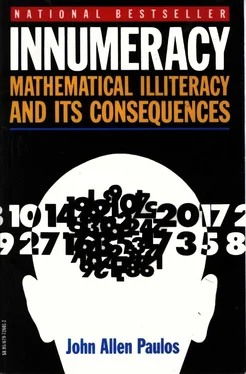Mathematics majors who continue their studies will find that graduate education in mathematics, in great contrast to that at lower levels, is the best in the world. Unfortunately, by this time it's too late for most, and this preeminence in research doesn't filter down to lower levels, due in good measure to the failure of American mathematicians to reach an audience wider than the small number of specialists who read their research papers.
Excluding certain textbook authors, only a handful of mathematics writers have a lay audience of more than a thousand. Given this sorry fact, it's perhaps not surprising that few educated people will admit to being completely unacquainted with the names Shakespeare, Dante, or Goethe, yet most will openly confess their ignorance of Gauss, Euler, or Laplace, in some sense their mathematical analogues. (Newton doesn't count, since he's much more famous for his contributions to physics than for his invention of calculus.)
Even at the graduate and research level, there are ominous signs. So many foreign students come to do their graduate work here, and so few American students major in mathematics, that in many departments American graduate students are a minority. In fact, of 739 doctorates in mathematics awarded by American universities in 1986-87, slightly less than half, only 362, were conferred on United States citizens.
If mathematics is important (and it certainly is), then so is mathematics education. Mathematicians who don't deign to communicate their subject to a wider audience are a little like multimillionaires who don't contribute anything to charity. Given the relatively low salaries of many mathematicians, both failings might be overcome if multimillionaires supported mathematicians who wrote for a popular audience. (Just a thought.)
One argument mathematicians cite for not writing for a larger audience is the esoteric nature of their work. There's something to this, of course, but Martin Gardner, Douglas Hofstadter, and Raymond Smullyan are three obvious counter-examples. In fact, some of the ideas discussed in this book are quite sophisticated, yet the mathematical prerequisites for understanding them are truly minimal: some facility with arithmetic and an understanding of fractions, decimals, and percentages. It is almost always possible to present an intellectually honest and engaging account of any field, using a minimum of technical apparatus. This is seldom done, however, since most priesthoods (mathematicians included) are inclined to hide behind a wall of mystery and to commune only with their fellow priests.
In short, there is an obvious connection between innumeracy and the poor mathematical education received by so many people. Hence this jeremiad. Still, it's not the whole story, since there are many quite numerate people who have had little formal schooling. More debilitating mathematically than ineffective or insufficient education are psychological factors.
INNUMERACY AND THE TENDENCY TO PERSONALIZE
One important such factor is the impersonality of mathematics. Some people personalize events excessively, resisting an external perspective, and since numbers and an impersonal view of the world are intimately related, this resistance contributes to an almost willful innumeracy.
Quasi-mathematical questions arise naturally when one transcends one's self, family, and friends. How many? How long ago? How far away? How fast? What links this to that? Which is more likely? How do you integrate your projects with local, national, and international events? with historical, biological, geological, and astronomical time scales?
People too firmly rooted to the center of their lives find such questions uncongenial at best, quite distasteful at worst. Numbers and "science" have appeal for these people only if they're tied to them personally. They're often attracted to New Age beliefs such as Tarot cards, the I Ching, astrology and biorhythms, since these provide them with personally customized pronouncements. Getting such people interested in a numerical or scientific fact for its own sake or because it's intriguing or beautiful is almost impossible.
Though innumeracy may seem far removed from these people's real problems and concerns-money, sex, family, friends-it affects them (and all of us) directly and in many ways. If you walk down the main street of a resort town any summer night, for example, and see happy people holding hands, eating ice-cream cones, laughing, etc., it's easy to begin to think that other people are happier, more loving, more productive than you are, and so become unnecessarily despondent.
Yet it is precisely on such occasions that people display their good attributes, whereas they tend to hide and become "invisible" when they are depressed. We should all remember that our impressions of others are usually filtered in this way, and that our sampling of people and their moods is not random. It's beneficial to wonder occasionally what percentage of people you encounter suffer from this or that disease or inadequacy.
It's natural sometimes to confuse a group of individuals with some ideal composite individual. So many talents, so many different attractions, so much money, elegance, and beauty on display, but-and it's a trivial observation-this multitude of desiderata is inevitably spread out among a large group of people. Any given individual, no matter how brilliant or rich or attractive he or she is, is going to have serious shortcomings. Excessive concern with oneself makes it difficult to see this and thus can lead to depression as well as innumeracy.
Too many people, in my opinion, maintain a "Why me?" attitude toward their misfortunes. You needn't be a mathematician to realize that there's something wrong statistically if most people do this. It's like the innumerate high school principal who complains that most of his students score below his school's median SAT score. Bad things happen periodically, and they're going to happen to somebody. Why not you?
THE UBIQUITY OF FILTERING AND COINCIDENCE
Broadly understood, the study of filtering is nothing less than the study of psychology. Which impressions are filtered out and which are permitted to take hold largely determines our personality. More narrowly construed as the phenomenon whereby vivid and personalized events are remembered and their incidence therefore overestimated, the so-called Jeane Dixon effect often seems to lend support to bogus medical, diet, gambling, psychic, and pseudoscientific claims. Unless one is almost viscerally aware of this psychological tendency toward innumeracy, it is liable to bias our judgments.
As we've noted, a defense against this tendency is to look at bald numbers, to provide some perspective. Remember that rarity in itself leads to publicity, making rare events appear commonplace. Terrorist kidnappings and cyanide poisonings are given monumental coverage, with profiles of the distraught families, etc., yet the number of deaths due to smoking is roughly the equivalent of three fully loaded jumbo jets crashing each and every day of the year, more than 300,000 Americans annually. AIDS, as tragic as it is, pales in worldwide comparison to the more prosaic malaria, among other diseases. Alcohol abuse, which in this country is the direct cause of 80,000 to 100,000 deaths per year and a contributing factor in an additional 100,000 deaths, is by a variety of measures considerably more costly than drug abuse. It's not hard to think of other examples (famines and even genocides scandalously underreported), but it's necessary to remind ourselves of them periodically to keep our heads above the snow of media avalanches.
If one filters out banal and impersonal events, most of what's left are astounding aberrations and coincidences, and one's mind begins to resemble the headlines of supermarket tabloids.
Читать дальше












